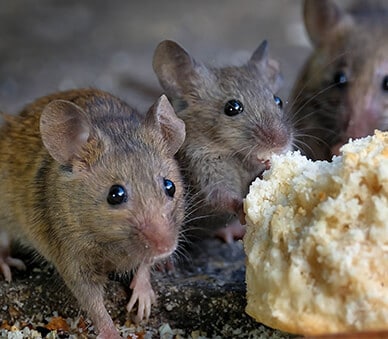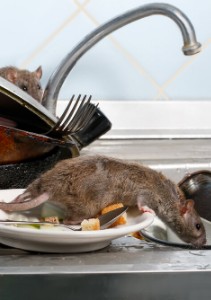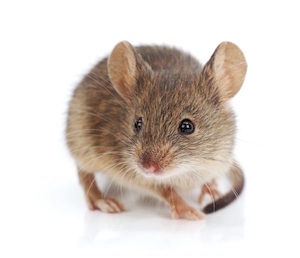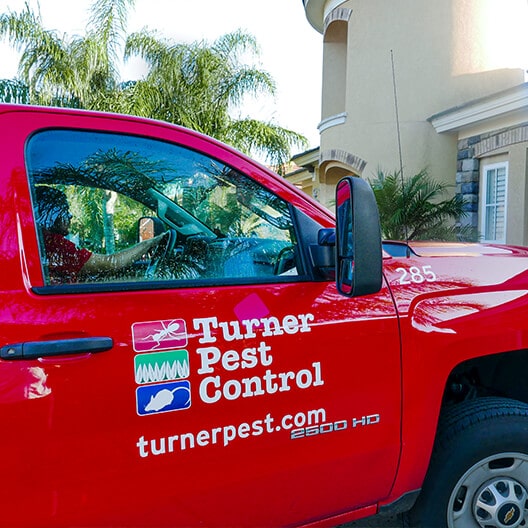FAST, EFFECTIVE EXTERMINATION OF MICE AND RATS
When you have rodent trouble, a solution can’t wait.

HAVE A PROBLEM WITH MICE OR RATS? TURNER PEST CONTROL CAN SOLVE IT!
A few rats or mice can quickly become a dangerous infestation. Call us at the first sign of rodent activity.
The Tampa pest control experts at Turner Pest Control can quickly get rid of rats, mice or other rodents in your home. Our experienced technicians offer fast, friendly service and use the most up-to-date methods and products to exterminate these pests.
Our rat and mouse extermination services
Did you know that a single female rat can reproduce every three weeks? That’s why it’s so important to get professional rodent control as quickly as possible after spotting a rodent in your home. To keep the rat or mouse population from growing, our experienced technicians will place traps in strategic locations and bait them with the bait that your particular type of rodent prefers. We also inspect your home to ensure that any potential entry points are sealed to prevent future infestations.
Here’s what you can expect from our Tampa rodent control service:
A FREE INSPECTION: During a thorough inspection of your property, we locate all of the places where rodents may enter, nest, and travel through your home.
A TAILORED PLAN: Our analysis is the foundation for a plan that’s customized to your unique needs and to the severity of the infestation.
TREATMENT CHOICES: Every customer’s needs are different, so we offer you choices: a rodenticide in bait form, or snap traps that are safer for children and pets.
MONITORING: We place traps or bait in strategic locations throughout your home, then return at regular intervals to empty and relocate traps until your problem is resolved.
RODENTS 101: WHAT TO KNOW
Some household pests are just annoying, but rodents pose a number of threats that make professional Tampa pest control a must.
The more you know about rodents and their habits, the better you can keep these dangerous pests away from your home and family.
Common rodent infestation signs: Rats and mice come inside to find shelter, food, water and safe nesting spots. Even if you don’t see one scampering along your baseboards, you’ll notice evidence of their presence in your home, such as:
- Noises: These may be the first signs you notice. At night, you may hear scratching or scurrying sounds as members of a rodent family move around in walls or your attic.
- Tracks or rub marks: The oily fur of rodents can leave greasy or dirty marks as they move very closely along baseboards and walls.
- Nests: The ideal spot for a rodent to nest is in dark, out-of-the-way places where they’re less likely to be disturbed. Keep an eye out for small piles of insulation, fabric, and shredded paper or packing materials that mice like to use for nest building.
- Signs of gnawing: Rodents have to gnaw to keep their teeth sharp. Unfortunately, some of the things they prefer to gnaw on are important to the structural integrity and safety of your home, such as pipes, wires in the walls, and wooden parts of your home’s structure.
- Droppings: These are perhaps the easiest evidence to spot around your house. These tiny pellets are left behind in kitchen pantries or cabinets where rodents have gone to look for food. You may also see mouse droppings along baseboards, in cardboard containers and under both bathroom and kitchen sinks. Be sure to use gloves when cleaning up rodent droppings since they may transmit disease or aggravate allergies.
WHAT TO KNOW ABOUT RODENTS
Some household pests are just annoying, but rodents pose a number of threats that make professional extermination a must.
DANGERS
Rodents can carry diseases that can be contracted by having contact with their feces, saliva, urine, or bodies, or by being bitten. They also indirectly spread disease through insects that have fed on them.
DIET
Mice and rats will eat any type of food they find. While they don’t consume wiring or wood, they chew them to sharpen their teeth or create nests. Chewed wiring in your home or vehicle can lead to a fire.
INFESTATION SIGNS
Even if you don’t see a rodent, you may see their signs: droppings along baseboards, in boxes, or where food is stored or prepared. You may see damage they’ve done to food packaging or hear them moving around.
PREVENTION
Keep rodents away by taking away their access to your food—store food in sealed containers that rodents can’t chew through. You should also find and eliminate their entry points, even those as small as a quarter of an inch.
EXTRA PROTECTION
Contact Turner Pest Control for premier rodent control and prevention
RODENT PREVENTION MEASURES FOR YOUR TAMPA HOME.
Rodents live in every corner of the country, so there’s a good chance rats or mice will make their way into your Tampa home at some point. There’s a lot you can do, however, to prevent them from setting up housekeeping in your house:
- Eliminate entry points. This includes holes in your walls where utilities, plumbing and cables come in, and gaps around doors and windows. Fill or patch holes, add new weatherstripping, and keep screens on doors and windows in good condition.
- Remove sources of food and water. Even a few crumbs from a late-night snack can attract rodents, so keep counters and floors free of bits of food and store food in airtight containers. Wipe up spills promptly, and repair plumbing leaks and drips. Remove your pet’s food and water bowls at night, both indoors and outdoors.
- If you have gutters, keep them clean; if you don’t, considering having them installed. Keeping water channeled away from your home is good DIY prevention for all types of pests, including rodents.
- Keep mulch several inches away from your home’s foundation to avoid creating nesting spots for rodents.
- Make sure outdoor garbage cans are tightly sealed.
- Call for professional rodent extermination at the first sign of trouble. Some rodents can have up to 12 babies every three weeks, so the earlier you call, the faster the infestation will be interrupted.
Threats to health and property: Hantavirus, bubonic plague, salmonellosis and rat-bite fever are just some of the infectious diseases that can be transmitted by rodents. Disease is not only spread by touching an infected rat or mouse (dead or alive)—it’s also transmitted by rodents’ fecal matter. To make matters worse, the fleas, mites and ticks that feed on rodents can contaminate your food and transmit disease.
Rodents also pose a significant risk to your property. They can gnaw through wiring, wallboards, wood and cardboard, and destroy the insulation in your attic. They’ll even damage the wiring in your vehicles and nest under the hood.
Tampa Rodent Control FAQs
Don’t see your question answered? Get in touch today!





